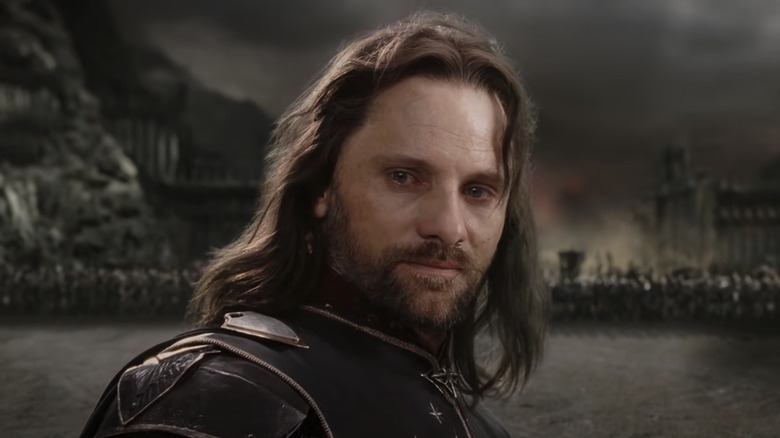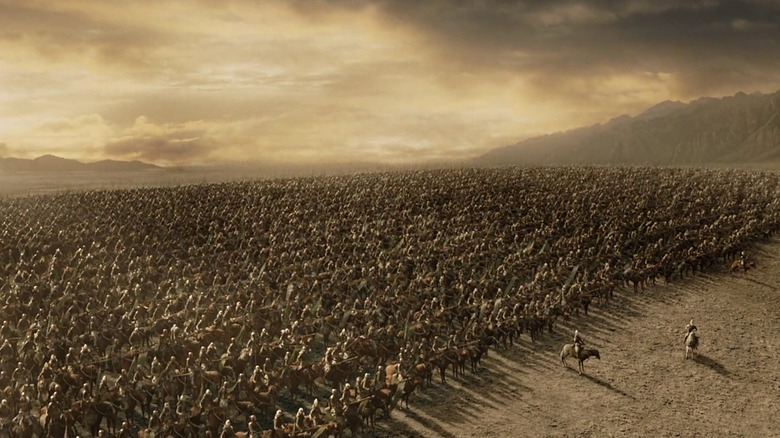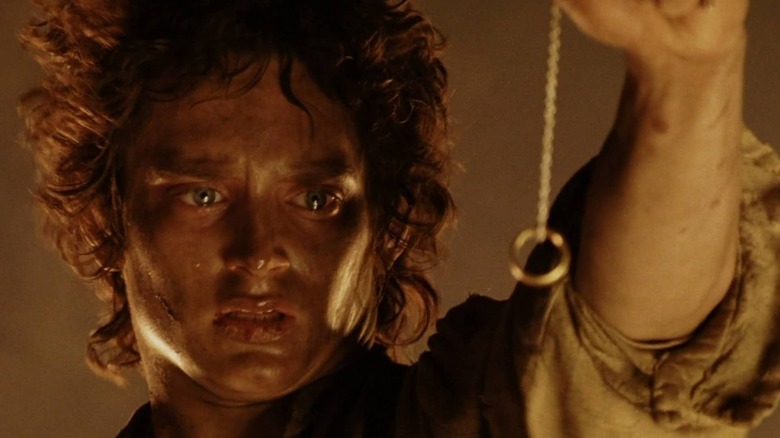Fathom's LOTR: Return Of The King Event Beat Air & Renfield At The Box Office
It's been nearly 20 years since Peter Jackson's epic cinematic adaptation of J.R.R. Tolkien's "The Lord of the Rings" trilogy wrapped up. The final installment of the three-part story, "The Return of the King," charged into theaters on December 17, 2003 and spent the next six months dominating the box office as it enraptured audiences, racked up Oscars, and generally ushered in the golden age of cinematic fantasy films that followed. The runtime for the original theatrical cut was three hours and 21 minutes — already a massive film for audiences at the time. A year later, Jackson released an extended edition with 50 minutes of additional footage (a small movie in and of itself), bringing the runtime total past the four-hour mark.
Both the theatrical and extended editions of Peter Jackson's monumental trilogy have gone down in history as some of the greatest fantasy films ever created. Even two decades later, they still hold up, from the acting to the sets to the CGI. Even Andy Serkis' fully computer-generated Gollum is still easy to watch (unlike, say, Jar Jar Binks, who only predates Serkis' on-screen character by three years). "The Return of the King" set such an impeccable standard in filmmaking that now, within a few months of the movie's twentieth birthday, it has made its way back into theaters — only to prove with eucatastrophic effect that it's still got it.
The movie hit theaters again on Thursday, April 13th. The following day, Indie Wire reported that it hadn't just done well: "The Return of the King" had outgrossed "Air" (in its second week since its release) and both "Renfield" and "The Pope's Exorcist" on their Thursday night openings. Not only that, but it had done so while running in significantly fewer theaters.
Fathom's Lord of the Rins anniversary event takes off
The re-release of "The Return of the King" is an unusual event. Not too many movies get a second theatrical run. In this case, Fathom Events initially resurrected the iconic film, setting up an extremely limited release of just a couple of showings. As fans caught onto the fact that a 20th-anniversary theatrical release was taking place, those showings filled up, and more were planned. The demand was so strong that, the week before the fun kicked off, Fathom announced that participating theaters were expanding the showings to span the six-day stretch from April 13th through the 18th, with additional showings on the 20th.
Despite the demand, there were only 1,100 theaters formally participating in the Fathom event. In comparison, "Air" was playing in 3,507 theaters on its second Thursday, while "Renfield" and "The Pope's Exorcist" were previewing in 2,750 and 2,650 theaters, respectively. Despite the disparity in screen count, "The Return of the King" grossed $1.2 million on its 2023 opening night, making it the second most popular film on that day behind the runaway box office hit "Super Mario Bros." In comparison, "Air" only grossed $982,598 and Renfield and "The Pope's Exorcist" came in below that.
Timing was clearly on the side of Aragorn, Frodo, and company. Thursdays aren't historically the big money makers, even with tentpole films. The lack of any serious competition (Mario aside) also helped. But that doesn't change the fact that "The Return of the King" was able to ride back into theaters with gusto, even after a 20-year hiatus. On the surface, the reason for "The Return of the King" having such a successful re-release is simple: it's Tolkien. But there's more driving its success than just pre-existing popularity.
Why has the re-release of Return of the King been so successful?
Middle-earth is a popular IP treasured by multiple generations and demographics. Even the trilogy of "Hobbit" films, which are generally seen as sub-par compared to "The Lord of the Rings," were appointment viewing for millions of fans.
General attractions aside, there were a few distinct things drawing viewers back to theaters for a 2023 viewing of 2003's number-one fantasy film. For instance, Elijah Wood returned in an intro for the limited event focused on the enduring popularity of Tolkien's universe. The introduction was slated to play before each screening.
In addition, there's the 20th-anniversary buzz. Whenever a classic hits a major anniversary milestone, you can expect fandom to participate in any festivities, en masse. It's also worth noting that the generational appeal of Middle-earth means there are many fans in their teens and 20s that never had the opportunity to watch "The Return of the King" on the big screen when it was originally released. Many of this younger generation got an unexpected opportunity to receive the cinematic experience of scenes like the charge of the Rohirrim at the Battle of the Pelennor Fields, or Frodo and Sam on Mount Doom.
In recent years, Tolkien's works have found new life. Amazon Studios' "The Rings of Power" is steaming ahead toward the release of Season 2. Warner Bros just announced a new slate of full-length "Lord of the Rings" films. Multiple games — both of the digital and physical variety — are coming out based on Tolkien's world. Everywhere you look, Tolkien's legacy is alive and well. Still, it's fun to see that, even 20 years later, Jackson's gold standard can still keep up with the newer content.


